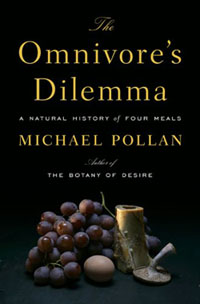So I finally finished my copy of the Omnivore’s Dilemma, lent out to me by my workplace. Written by journalist Michael Pollan, the book traces the origins of four types of meals that a modern-day omnivore might consume: 1) the fast-food meal composed of the byproducts of industrial agriculture  2) the “big organic” meal made with certified organic food purchased from stores such as Whole Foods, sourced mainly from large-scale, often international, farms 3) the meal made with naturally raised meat and produce from small family farms 4) and the meal that is completely hunted, foraged and cooked by oneself.
2) the “big organic” meal made with certified organic food purchased from stores such as Whole Foods, sourced mainly from large-scale, often international, farms 3) the meal made with naturally raised meat and produce from small family farms 4) and the meal that is completely hunted, foraged and cooked by oneself.
The book gets off to a fairly slow start, delving deep into the history and genetic makeup of corn. What was once a staple of Native American diets is today an agricultural monster, appearing in various forms in nearly every aisle of the supermarket. Pollan does a good job, though, of tracing the origin of corn subsidies and how these cash payments to farmers changed the American diet forever. Basically, because corn is so artificially cheap and plentiful, American companies have been trying to figure out for years how to incorporate it into nearly everything we eat, thus replacing more expensive ingredients. Hello, high-fructose corn syrup! As a result, Americans are spending less of their disposable income than ever before on food, except that their overall health is declining. Pollan outlines very clearly the difference between grass-fed and corn-fed meat, which since I work at an organization that deals mainly with sustainable agriculture and thus many grass farmers, I am more than familiar with, but I am constantly amazed by how little people know about their meat. So hopefully, these chapters will open some eyes about the health benefits of pasture-raised meats.
After a mild attack on Whole Foods for farming out (haha) most of their purchases to large-scale organic farms in far-flung places, the most entertaining and informative chapters were by far the ones where he visited Joel Salatin’s Polyface Farm in Swoope, Virginia. Salatin is a small family farmer, as well as a god of sorts to the grass-based set. He’s written several books himself about farming, and he also coined the phrase “salad bar beef,” which refers to the wide variety of grasses that pastured cattle consume each day. As much damage as industrial farming may be doing to the Earth, it’s comforting to read about a farmers who treads so lightly upon his patch of land, treating both the animals and plants with utmost respect. I don’t think that animals could have it any better than at Salatin’s farm.
Aside from a brief, somewhat interesting philosophical dive into the politics of eating meat and being a responsible omnivore, the rest of Pollan’s book is a rather personal first-hand account of his experiences with hunting and foraging. I appreciate that he explores all options of sourcing a meal, but really, how many people out there have the means to do so themselves? Um, I don’t see any wild boars or chanterelles in Jersey City.
Though the book feels patched together at points (I get the feeling that Pollan has been researching parts of this book for years, then threw in some handy bridge chapters), it is filled with useful information and statistics. And, one of the main benefits of reading Pollan is that he is an engaging and clear writer. Though a lot of the topics seemed routine to me because of my line of work, I am planning on recommending it to all my friends who ignorantly chomp away at their Purdue Skinless Boneless and Cocoa Puffs. After reading the book, food will never look the same.